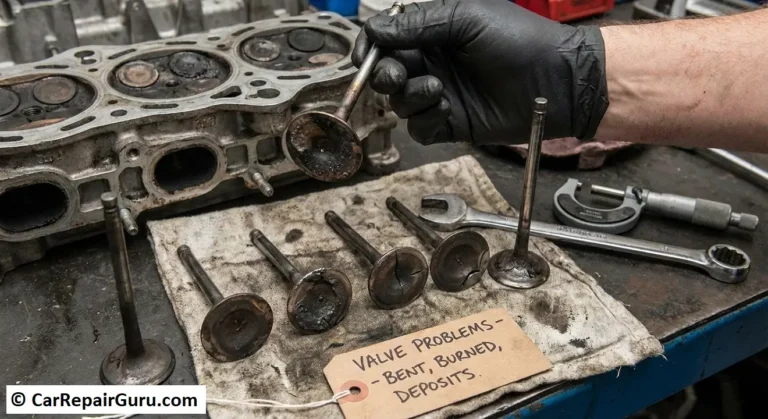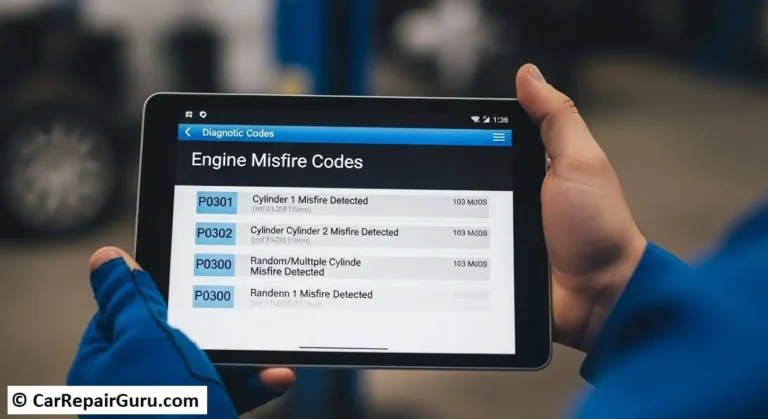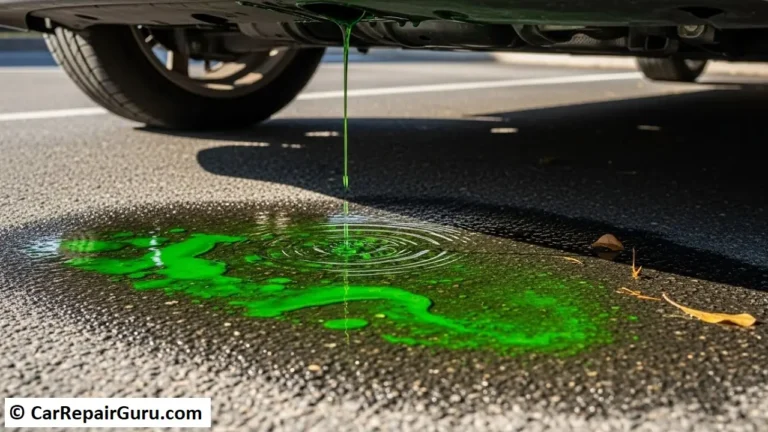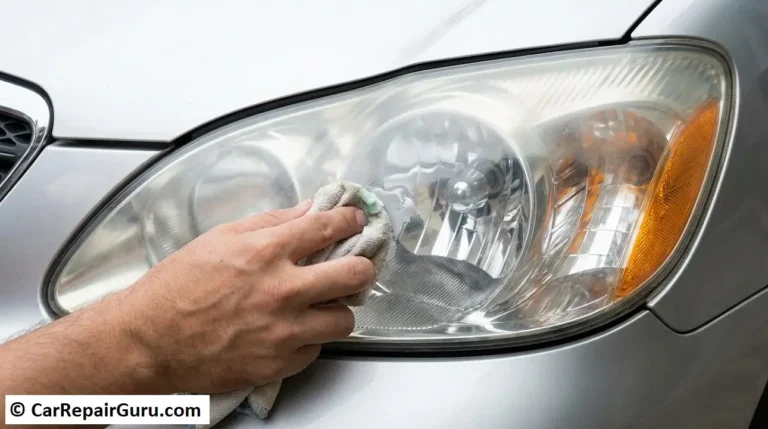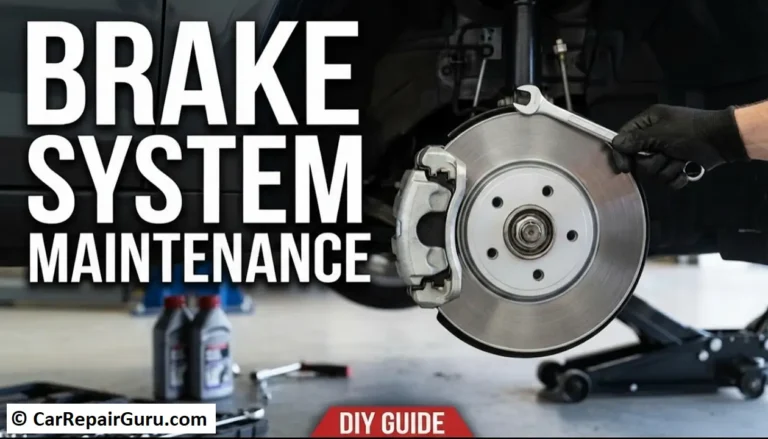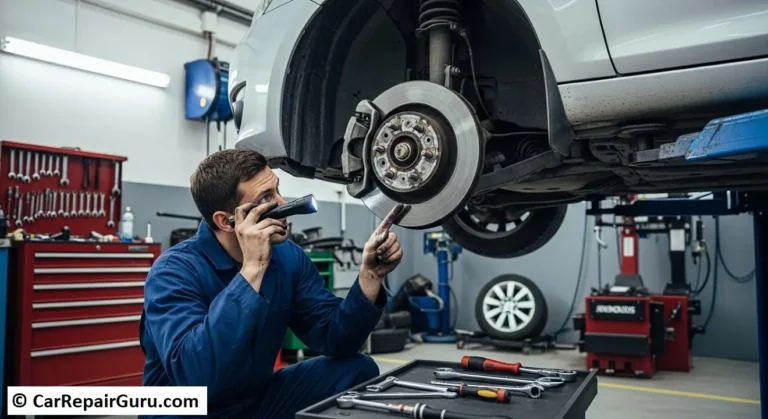
You’re driving down the road, music playing, when you hear it—a faint, rhythmic tapping or a deep, unsettling clunking sound coming from under the hood. Your heart sinks. That dreaded sound is engine knocking, and it’s your car’s way of screaming for help.
Ignoring an engine knock is one of the most expensive mistakes a car owner can make. But what exactly is it? And more importantly, what should you do about it?
Don’t worry. This guide will walk you through everything. We’ll demystify that noise, explain what causes it, and help you figure out the right next steps.
Here’s what you’ll learn:
- What engine knocking sounds like (and how it differs from other noises).
- The top 7 causes, from simple fixes to severe mechanical failures.
- Whether it’s safe to drive your car (spoiler: it’s not).
- How to fix engine knock and the potential repair costs.
- Simple ways to prevent it from ever happening again.
- What is Engine Knocking and What Does It Sound Like?
- Knock vs. Ping vs. Tick – Understanding the Sounds
- The Top 7 Common Causes of Engine Knocking (From Simple to Severe)
- 1. Using the Wrong Fuel Octane
- 2. Carbon Buildup on Engine Components
- 3. Faulty or Incorrect Spark Plugs
- 4. Low Engine Oil or Poor Oil Circulation
- 5. A Faulty Knock Sensor
- 6. Worn Engine Bearings (Rod Knock)
- 7. Issues with Belt-Driven Accessories
- Is Engine Knocking Serious? Can I Keep Driving?
- Engine Knocking Repair Cost – What to Expect
- How to Prevent Engine Knocking
- Don’t Ignore the Knock
- Frequently Asked Questions (FAQ)
- What’s the difference between engine knocking and lifter tick?
- Will a simple oil change fix engine knocking?
- Can engine knocking go away on its own?
- Does engine knocking always mean I need a new engine?
What is Engine Knocking and What Does It Sound Like?
At its core, engine knocking is a sound generated by a problem within your engine’s cylinders or its moving mechanical parts. However, not all knocks are created equal. The term is often used to describe two very different problems:
- Spark Knock (or Pinging/Detonation): This is a combustion problem. Normally, the air-fuel mixture in a cylinder is ignited by the spark plug at a precise moment, creating a smooth, powerful push on the piston. Spark knock happens when that mixture ignites prematurely or unevenly, creating multiple flame fronts that collide. This collision creates a sharp, high-pitched “pinging” or rattling sound.
- Mechanical Knock (like Rod Knock): This is a physical problem. It’s the sound of metal violently striking metal inside the engine, usually because a part is worn out or there’s not enough oil to cushion it. This is a much deeper, heavier sound that often gets louder and faster as you increase the engine’s RPMs.
Because the sounds can be so different, identifying which one you have is the first step toward a diagnosis.
Knock vs. Ping vs. Tick – Understanding the Sounds
| Sound | Description | Common Cause | Severity |
|---|---|---|---|
| Deep Knock (Rod Knock) | A deep, heavy “thud” or “clunk” that gets faster with engine speed. It sounds like a hammer hitting the engine block from the inside. | Worn Engine Bearings | Extremely High |
| Ping (Spark Knock) | A high-pitched, metallic “rattle” or “pinging” noise, similar to marbles shaking in a can. Often heard during acceleration. | Pre-ignition/Detonation | Moderate to High |
| Tick | A rhythmic, light “tapping” sound, much like a sewing machine. The speed of the tick follows the engine’s speed. | Valve Train / Lifter Issue | Low to Moderate |
The Top 7 Common Causes of Engine Knocking (From Simple to Severe)
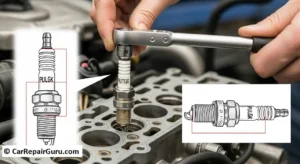
Let’s break down the most common culprits behind that noise, starting with the easiest to fix and moving toward the more serious mechanical failures.
1. Using the Wrong Fuel Octane
- Why it happens: The octane rating of gasoline (87, 89, 91, etc.) measures its ability to resist detonation. High-performance or turbocharged engines compress the air-fuel mixture more intensely and require higher-octane fuel. If you use a lower octane than your manufacturer recommends, the pressure can cause the fuel to ignite too early, leading to spark knock.
- Symptoms: You’ll typically hear a light engine pinging sound, especially when the engine is under load, such as when accelerating hard or climbing a steep hill.
- The Fix: This is the best-case scenario. Simply fill your tank with the correct, higher-octane fuel next time. You can also add a bottle of octane booster as a temporary fix. The problem should resolve on its own.
- Severity: Low.
2. Carbon Buildup on Engine Components
- Why it happens: Over time, unburnt fuel and oil byproducts can form hard carbon deposits on your pistons, valves, and cylinder heads. These deposits do two bad things: they increase the engine’s compression ratio to levels it wasn’t designed for, and they can create “hot spots” that glow red and ignite the fuel before the spark plug does.
- The Fix: A good first step is to use a high-quality fuel system cleaner that you pour into your gas tank. For more stubborn buildup, a professional mechanic can perform an engine carbon cleaning service.
- Severity: Low to Moderate.
3. Faulty or Incorrect Spark Plugs
- Why it happens: Spark plugs are the heart of the combustion process. If they are old and worn, they can’t produce a strong, consistent spark, leading to inefficient combustion. More importantly, each engine requires a spark plug with a specific “heat range.” Using a plug that is too “hot” for your engine can cause it to overheat and become a source of pre-ignition, just like a carbon deposit.
- The Fix: Replace the spark plugs with the exact type specified by your vehicle’s manufacturer. This is a common maintenance item and is a relatively affordable fix.
- Severity: Moderate.
4. Low Engine Oil or Poor Oil Circulation
- Why it happens: This is where we cross into serious territory. Engine oil is the lifeblood of your motor. It lubricates moving parts, creating a thin, protective film to prevent metal-on-metal contact. When the oil level is critically low or the oil is old and broken down, that film disappears. Parts like connecting rods, pistons, and the crankshaft begin to slam into each other.
- The Fix: If you suspect this is the cause, stop driving immediately. Pull over, turn off the engine, and check your oil dipstick. If it’s low, add the correct type of oil. If the oil level is fine but the sound persists, the damage may already be done. The vehicle should be towed to a mechanic.
- Severity: Very High to Critical.
5. A Faulty Knock Sensor
- Why it happens: Modern engines are equipped with tiny microphones called knock sensors. Their entire job is to listen for the specific frequency of engine pinging. When they detect it, they instantly signal the engine’s computer (ECU) to adjust the ignition timing to stop it. If this sensor fails, the engine can’t protect itself from detonation, allowing the knock to continue and cause damage.
- The Fix: A mechanic will need to use a diagnostic tool to confirm the sensor has failed and then replace it.
- Severity: Moderate. The failed sensor itself isn’t a disaster, but the unchecked knocking it allows is very damaging.
6. Worn Engine Bearings (Rod Knock)
- Why it happens: This is the most feared of all engine noises: the infamous rod knock. Deep inside your engine, the connecting rods are attached to the crankshaft with small, soft metal inserts called bearings. These bearings provide a cushion for the violent forces of combustion. Due to high mileage, poor maintenance, or oil starvation, these bearings wear out. The extra space allows the connecting rod to hammer against the crankshaft with every rotation.
- Symptoms: A deep, loud, and hollow clunking that gets faster and louder as you rev the engine. It will not go away.
- The Fix: This is not a simple repair. It requires a complete engine teardown to replace the bearings (an engine rebuild) or, more commonly, a full engine replacement.
- Severity: Critical. This is often a catastrophic failure.
7. Issues with Belt-Driven Accessories
- Why it happens: Sometimes, the noise isn’t coming from inside the engine at all. The components on the outside of your engine—like the water pump, alternator, power steering pump, or A/C compressor—are driven by a belt. If the internal bearings of one of these accessories fail, they can create a loud rumbling or knocking sound that can be easily mistaken for a more serious internal car engine knocking issue.
- The Fix: A mechanic can use a stethoscope to isolate the noise to the specific failing component, which can then be replaced.
- Severity: Low to Moderate. The part needs to be replaced, but your engine itself is likely safe.
Is Engine Knocking Serious? Can I Keep Driving?
The short, non-negotiable answer is yes, it is always serious, and you should stop driving as soon as it’s safely possible.
Continuing to drive with a knocking engine is a massive gamble. Here’s why:
- If it’s Spark Knock/Pinging: Prolonged detonation can superheat the cylinders, leading to melted pistons, damaged cylinder walls, and blown head gaskets. What starts as a simple problem can quickly snowball into thousands of dollars in repairs.
- If it’s a Mechanical Knock (Rod Knock): You are on borrowed time. Every single rotation of the engine is causing more damage. The connecting rod can eventually break free and punch a hole straight through the side of your engine block, causing a complete and irreparable failure.
If the knock is loud, deep, or accompanied by a flashing check engine light, pull over immediately and call for a tow. It’s not worth the risk.
Engine Knocking Repair Cost – What to Expect
The engine knock repair cost depends entirely on the cause. The financial difference between a simple fix and a major failure is staggering.
| Cause of Knock | DIY Fix Possible? | Estimated Repair Cost |
|---|---|---|
| Wrong Fuel Octane | Yes | $10 – $20 (Fuel additive/premium fill-up) |
| Carbon Buildup | Yes (Cleaner) | $15 (DIY cleaner) to $150 – $400 (Professional service) |
| Faulty Spark Plugs | Yes (for some) | $50 – $150 (DIY) to $200 – $500 (Professional repair) |
| Low Engine Oil | Yes (adding oil) | $20 – $70 (Oil and filter) |
| Faulty Knock Sensor | No | $150 – $450 |
| Worn Belt/Pulley | No | $200 – $600 |
| Worn Engine Bearings (Rod Knock) | No | $2,500 – $7,000+ (Engine rebuild or replacement) |
Disclaimer: These costs are general estimates. Prices can vary significantly based on your vehicle model, location, and the specific repair shop.
How to Prevent Engine Knocking
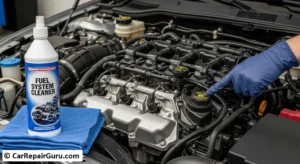
The best way to fix an engine knock is to never let it happen in the first place. Good maintenance is your best defense.
- Use the Right Fuel: This is the easiest one. Check your owner’s manual (or the inside of your gas cap) and always use the recommended octane rating.
- Perform Regular Oil Changes: Clean oil is everything. Follow your vehicle’s recommended oil change schedule religiously using a quality oil and filter. This prevents the mechanical wear that leads to rod knock.
- Follow Scheduled Maintenance: Don’t skip tune-ups. Replacing spark plugs, filters, and other components on time ensures your engine runs efficiently and cleanly.
- Use a Quality Fuel System Cleaner: Every 5,000-10,000 miles, add a bottle of reputable fuel injector cleaner to your gas tank to prevent carbon deposits from forming.
- Don’t Ignore Your Check Engine Light: That little light is your car’s early warning system. Get it diagnosed promptly before a small issue becomes a big one.
Don’t Ignore the Knock
An engine knock is more than just an annoying sound; it’s a critical warning sign. While the cause can sometimes be as simple as using the wrong gas, it can also signal a catastrophic internal failure that is just moments away.
Your best course of action is to stop, listen, and assess. Perform the simple checks yourself—look at your fuel receipt, check your oil level. But for any persistent, loud, or deep knocking sound, the answer is always the same: get your vehicle to a certified mechanic right away. Addressing the problem early can save you from a massive repair bill and keep you safely on the road.
Frequently Asked Questions (FAQ)
What’s the difference between engine knocking and lifter tick?
The location and sound are the main differences. A lifter tick is a light, fast, “tapping” noise that comes from the top part of the engine (the valvetrain). It’s generally less severe. An engine knock is usually a deeper, heavier “clunk” or “ping” originating from the combustion chamber or the bottom end of the engine and is almost always more serious.
Will a simple oil change fix engine knocking?
An oil change will only fix a knock if the direct cause was extremely low or degraded oil and no permanent mechanical damage has occurred yet. If the knock is from worn-out parts like bearings (rod knock), a fresh oil change will not fix the existing damage.
Can engine knocking go away on its own?
A light ping from a bad tank of gas might go away once you fill up with the correct fuel. However, a true mechanical knock will never go away on its own. It will only get progressively louder and more destructive over time.
Does engine knocking always mean I need a new engine?
Absolutely not. This is a common fear, but it’s not always reality. If the car engine knocking is caused by fuel, spark plugs, or carbon buildup, the fix is relatively simple and affordable. A new engine is typically only required for the most severe cases, like advanced rod knock where significant internal damage has occurred.
